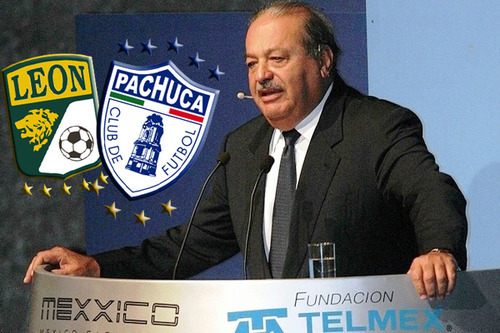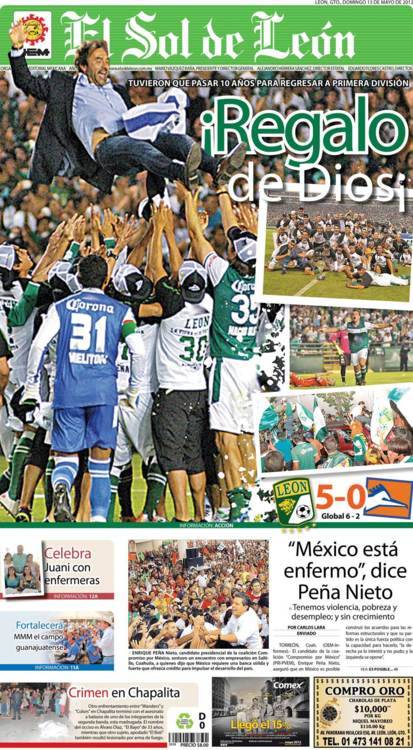In Mexico, one football club is not enough for the world’s richest man?
In Mexico, one football club is not enough for the world’s richest man?


Divide et impera. Divide and conquer. The strategy implemented by many a great leader over the centuries, from Caesar to Napolean to Stalin, is now being put to work in the competitive world of Mexican television rights by Carlos Slim, the world’s richest man and owner of the telecommunications giants Telmex and América Móvil.
Earlier this month, América Móvil purchased a 30% stake in Grupo Pachuca, whose holdings include the Mexican top flight clubs C.F. Pachuca and Club León. The purchase was met with enthusiasm from supporters expecting Slim to lavish similar fortunes to those a myriad of less-wealthy Russian Oligarchs, Arab Sheikhs and Asian businessman have on other teams across the globe.
But such expectations were unrealistic. Slim’s sporting loves are baseball, boxing and motor racing. His investment into these clubs was not an act of vainglory, a pursuit of celebrity or praise. No, Slim’s motives were purely business orientated, the purchase his latest attempt to shake up the Mexican television market’s dominant axis of Televisa and TV Azteca.
Telmex has been seeking a domestic television broadcast license since 2006, but its attempts to do so have been thwarted by hostility from Televisa and TV Azteca, both wary of opening up the market to such a well-funded competitor. In retaliation, Slim withdrew advertising from both networks in early 2011. The loss in earnings for Televisa alone was estimated at $75 million.
Days after Slim’s investment into Grupo Pachuca was announced, he landed a second blow in his attempts to disrupt the television market.
Each Mexican club owns and licenses the television rights for its home matches. Until this season, all 18 top flight clubs licensed rights to either Televisa or TV Azteca. There existed a gentleman’s agreement between the clubs to do so, perhaps facilitated by both companies having holdings in Mexican teams. Televisa has owned Club América since 1959 and also owns second division side Necaxa. It owned San Luis too, until earlier this year. TV Azteca, through parent company Grupo Salinas, owns the Morelia club Monarcas and holds a large stake in Jaguares of Chiapas.

Club León, newly promoted from the second division, had been negotiating with TV Azteca, but were unhappy with the terms being offered, which were the same the television company had been paying Estudiantes Tecos, the team whose place in the top flight León had taken. Slim’s investment was almost immediately followed by an announcement that León’s rights for the remainder of the 2012/13 season had instead been sold to Fox Sports.
Not only were Fox Sports reportedly offering significantly more than TV Azteca for the rights, but selling to them also allowed Slim to take a swipe at both TV Azteca and Televisa, breaking their long-standing stranglehold over domestic football television rights. Pachuca’s rights are also up for negotiation next year and the smart money would be on it following León to Fox Sports.
With the hegemony now broken, there is a strong possibility that other clubs could follow León’s lead when next negotiating television contracts. Atlante, Chivas and Monterrey have all previously considered alternative options and should León and Pachuca gain a financial advantage from licensing rights to Fox Sports, other clubs will surely follow suit. In that situation, Televisa and TV Azteca could well find themselves bidding against one another for the rights to the remaining teams.
Televisa and TV Azteca’s parent company, Grupo Salinas, have maintained close ties in attempting to overturn Telmex’s domination of the Mexican fixed line, mobile phone and broadband markets. They even drew a competition watchdog review earlier this year when Televisa looked to purchase 50% of lusacell, owned by Grupo Salinas. By sparking a bidding war over football television rights, Slim could well be trying to strike a wedge between the two that will benefit all his business interests.
More likely is that in the absence of his own television network, Slim is trying to scatter teams across the various existing networks, opening the way for his streaming website UnoTV to step forward and become the de-facto distributor of Mexican football content. Slim angered his two rivals by providing free streaming coverage of the 2011 Pan American Games on the portal, which will now broadcast Club León’s home matches. Pachuca’s will surely follow next year as could those of other teams if attractive terms are offered.
You do not get to be as rich as Slim is without taking this kind of ruthless approach to business, but even though sporting reasons are unlikely to be the primary drive behind his investment, supporters of Club León and Pachuca can rest relatively easily. Both clubs are worth far more to Slim as successful operations - only truly dedicated fans will pay to watch teams that perpetually lose - and therefore, although his investment into the clubs is unlikely to be huge it will be sufficient to ensure they are both in playoff contention on a regular basis.
But for Slim, beating the likes of Club América or Monarcas is little more than a pleasant side effect as the success or failure of his investment will be determined far away from the football pitch. The die has been cast. There is little left to do but sit back and take in the fallout.
Nick is an itinerant freelance football writer for hire, specialising in South American and Mexican football. He can be contacted on twitter @chewingthecoca. Comments below please.
See if you can earn a fraction of Slim’s wealth over at Ladbrokes on their football slot games Shoot and Soccer Safari. They are both available to play here and when you sign up you will recieve some great bonuses to help you on your way.







